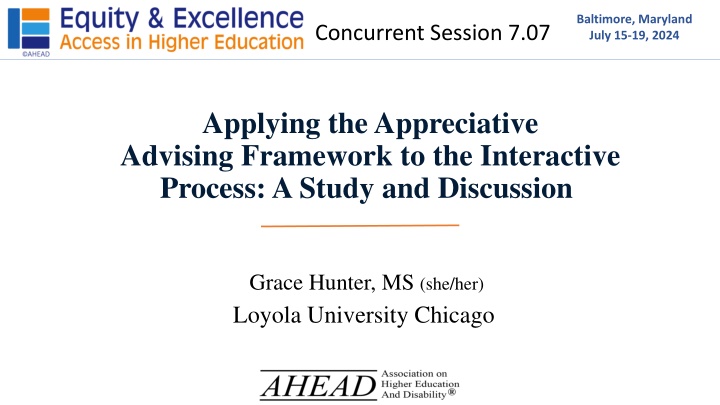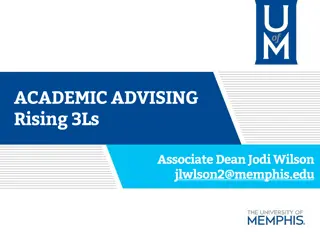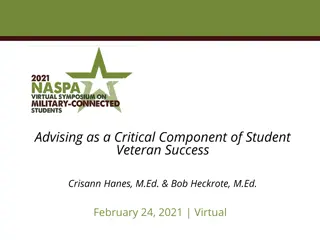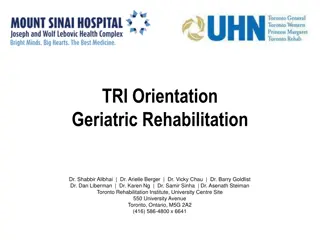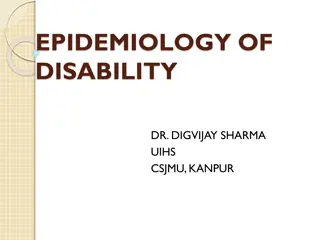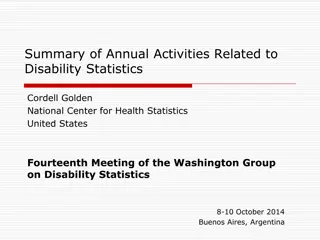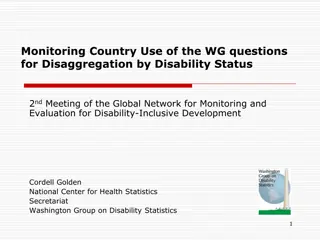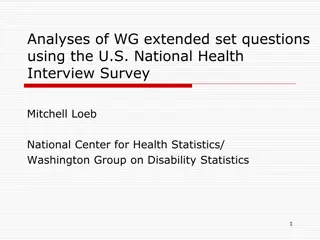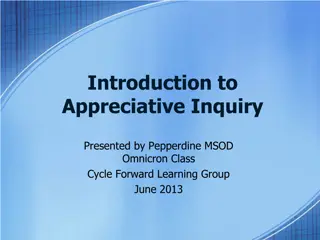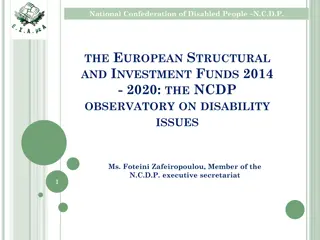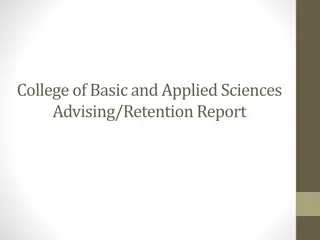Applying Appreciative Advising Framework in Disability Resource Practices
Explore the use of Appreciative Advising in enhancing communication and support for students with disabilities in higher education. Discuss the importance of deeper connections between disability resource professionals and students to improve sense of belonging and goal achievement. Learn about Astin's I.E.O. conceptual model and its implications in student involvement theory. Join the conversation on creating an inclusive and respectful environment.
Download Presentation

Please find below an Image/Link to download the presentation.
The content on the website is provided AS IS for your information and personal use only. It may not be sold, licensed, or shared on other websites without obtaining consent from the author.If you encounter any issues during the download, it is possible that the publisher has removed the file from their server.
You are allowed to download the files provided on this website for personal or commercial use, subject to the condition that they are used lawfully. All files are the property of their respective owners.
The content on the website is provided AS IS for your information and personal use only. It may not be sold, licensed, or shared on other websites without obtaining consent from the author.
E N D
Presentation Transcript
Baltimore, Maryland July 15-19, 2024 Concurrent Session 7.07 Applying the Appreciative Advising Framework to the Interactive Process:A Study and Discussion Grace Hunter, MS (she/her) Loyola University Chicago
Baltimore, Maryland July 15-19, 2024 Participant Reflection Questions Link to open reflection questions Answers are submitted anonymously and only used for discussion purposes. QR code will be displayed again during discussion portion of our session To begin reflection questions: oScan QR Code or click on the link to the right to display reflection questions oPaper copies available at entrance of our session room.
Baltimore, Maryland July 15-19, 2024 We ask you to join us in creating a culture that reflects Access and Inclusion and Civility and Respect this week and in all aspects of our organization. Please request permission from this author to use contents and slides of this presentation
Objectives Discuss the need for deeper connections and effective communication between disability resource professionals and students with disabilities Using Astin's I.E.O conceptual model of student involvement theory (1965), identify how the process of determining appropriate supports and accommodations positively contributes towards a student's sense of belonging and eventual goal attainment. Introduce Appreciative Advising and its practical applications to the interactive process and existing disability resource professional practices
Baltimore, Maryland July 15-19, 2024 The need for deeper conversations between disability resource professionals and students with disabilities in the college setting
Astin's "I.E.O Conceptual Model, Student Involvement Theory, (1984) Adapted by Grace Hunter Please request permission from this author to use contents and slides of this presentation Grace Hunter, MS Loyola University of Chicago Ghunter1@luc.edu
Impact of Access Barriers Using Astin's I.E.O Model, Student Involvement Theory (1984) Adapted by Grace Hunter Please request permission from this author to use contents and slides of this presentation Grace Hunter, MS Loyola University of Chicago Ghunter1@luc.edu
Navigation of Access Barriers Using Astin's I.E.O Model, Student Involvement Theory (1984) Adapted by Grace Hunter Please request permission from this author to use contents and slides of this presentation Grace Hunter, MS Loyola University of Chicago Ghunter1@luc.edu
Baltimore, Maryland July 15-19, 2024 What is appreciative advising? Strengths-based approach to facilitating advising sessions with students in the college setting (Bloom, Hutson & He, 2008) Deliberate use of appreciative inquiry, guided imagery, and open-ended questioning. 6 Phases of Engagement, The Appreciative Advising Revolution (2008). Link to the Office of Appreciative Education, Florida Atlantic University
Step 1: Disarm Key Features o Make a positive first impression with students and create a safe and welcoming environment AppreciativeAdvising Tools o Self-reflection o Generate one's own narratives in advising Application ideas for disability resource professionals (adapted by Grace Hunter) o Examining one's belief and understanding of disability, access, and social justice. o Acknowledgement of one's own experiences and identity in relation to disability (Adapted from The Appreciative Advising Revolution (2008) by Bloom, J.L, Hutson, B.L, & He,Y.)
Incorporating the Disarm phase into student meetings Welcoming students at the door Relaxed, comfortable settings for meetings Active listening and genuine curiosity in the student's story Sample questions and conversation starters o "Describe what your ideal college experience looks like" o "Tell me about a time where you enjoyed creating a classroom project or assignment. What about that experience was rewarding?" o "Why____? (name of chosen college or program). (Adapted from The Appreciative Advising Revolution (2008) by Bloom, J.L, Hutson, B.L, & He,Y.)
Step 2: Discover Key Features o Effective open-ended questioning o Attending behavior and active listening o Strength-based story reconstruction AppreciativeAdvising Tools o Appreciative advising inventory and questions o Note-taking strategies, graphic organizers Application ideas for disability resource professionals (adapted by Grace Hunter) o Inventory and/or open-ended questions to discover student's passion o Discover past barriers, guiding them from victim to creator language (Adapted from The Appreciative Advising Revolution (2008) by Bloom, J.L, Hutson, B.L, & He,Y.)
Incorporating the Discover phase into student meetings Inviting students to share their story however they best express their thoughts (visuals, writing, drawing, conversation, survey, etc.) When trust is established, guide student thorough thought process that will deepen their understanding of disability and its impact (or lack of impact) on individual academic and personal ideas of success Sample questions and conversation starters. o "Tell me about a teacher in high school that you had a positive relationship with. What did they do to support you that you wish you could share with your instructors in college? o "What is one thing you wish your instructors knew about you?" (Adapted from The Appreciative Advising Revolution (2008) by Bloom, J.L, Hutson, B.L, & He,Y.)
Step 3: Dream Key Features o Creating powerful images o Making purposeful connections between the Dream and Discover phase. AppreciativeAdvising Tools o Backwards designing o Personal "presidential cabinet" o Victim/Creator language Application ideas for disability resource professionals (adapted by Grace Hunter) o Ownership of student, faculty, and DRC roles in access o Victim/creator language: student's concept of disability o Backwards designing of support, strengths-based planning (Adapted from The Appreciative Advising Revolution (2008) by Bloom, J.L, Hutson, B.L, & He,Y.)
Incorporating the Dream phase into student meetings Visually map out the student's story as they share. Affirm the student's viewpoint and feelings with active listening. Make connections between student's strengths and passions and their intended goals (outputs) How does the student feel about their abilities? Personal challenges? Disability and how it is perceived culturally? Sample questions and conversation starters o Use open-ended phrases: "what if....another option......tell me how..." o "Describe an ideal day in college. What's one step you could take to get to that day?" o What is something you have accomplished in the last month or so that you feel most proud of? What is something that did not meet your expectations? (Adapted from The Appreciative Advising Revolution (2008) by Bloom, J.L, Hutson, B.L, & He,Y.)
Step 4: Design Key Features o Teach students how to make decisions o Provide positive feedback o Making effective referrals AppreciativeAdvising Tools o Backwards designing o Personal "presidential cabinet" o Victim/Creator language Application ideas for disability resource professionals (adapted by Grace Hunter) o Reduce use of acronyms and confusing language o Universal design elements in the DRC office: visual and written steps for implementing accommodations o Circle of support (Adapted from The Appreciative Advising Revolution (2008) by Bloom, J.L, Hutson, B.L, & He,Y.)
Incorporating the Design phase into student meetings Check for understanding, summarize and rephrase. Encourage positive self-talk ("creator language") and reduction of victim language. Empower students with choice.Answer questions with another question. Map out their plans and look at how accommodations support their intended goals and possible access barriers Sample questions o "Is there something we have talked about so far that doesn't make sense?" o "Who do you trust for advice on a variety of different topics?" o "When roadblocks in your plan come up, what are some ways you can navigate them?" (Adapted from The Appreciative Advising Revolution (2008) by Bloom, J.L, Hutson, B.L, & He,Y.)
Step 5: Deliver Key Features o Energizing students to be their best o Academic hope o Ending the conversation well AppreciativeAdvising Tools o Questions to close the meeting with students o Follow up and meeting notes Application ideas for disability resource professionals (adapted by Grace Hunter) o Modeling self-sufficiency and academic, personal hope o Advocacy and awareness of access barriers on campus. o Following up and surveying use of accommodations. (Adapted from The Appreciative Advising Revolution (2008) by Bloom, J.L, Hutson, B.L, & He,Y.)
Incorporating the Deliver phase into student meetings Model self-sufficiency and flexibility while recommending supports. There is most often "more than one right answer" and more than one way of viewing a challenge. If student encounters a roadblock, teach them how to navigate it with your support, then gradually reduce the "scaffolding". Sample questions and conversation starters o "What are you most looking forward to trying this week?" o "Is there anything else you feel like we haven't spoken about yet that you think is important to share about yourself?" o "What will you do if you realize that what you are trying isn't effective? (Adapted from The Appreciative Advising Revolution (2008) by Bloom, J.L, Hutson, B.L, & He,Y.)
Step 6: Don't Settle Key Feature o Challenge and support o Raising the bar o Virtuous cycle AppreciativeAdvising Tools o Appreciative advising rubric o Personal success letters o "Simple truths" web slideshow Application ideas for disability resource professionals (adapted by Grace Hunter) o Cycling back and maintain ongoing relationship with DRP. o DRC self-eval of services, surveying students. o Student advocacy and mentorship (Adapted from The Appreciative Advising Revolution (2008) by Bloom, J.L, Hutson, B.L, & He,Y.)
Incorporating the Don't Settle phase into student meetings Students who utilize their accommodations effectively are more likely to achieve their post-secondary goals. Communicate early and often about the effectiveness of an accommodation/modification. Have high expectations while respecting the individual who is still forming a self-concept and sense of belonging as an individual with a disability on campus. Questions and conversation starters: o "If you could give advice to other students who are dealing with challenges in accessibility, what would it be?" o "Have you made any new connections that you could potentially add to your circle of support? (Adapted from The Appreciative Advising Revolution (2008) by Bloom, J.L, Hutson, B.L, & He,Y.)
Concluding thoughts and ideas for future research Intentional, meaningful conversations between students and disability resource professionals are vital as the student develops greater sense of belonging and connection to their intended goals. Appreciative inquiry and genuine curiosity in the student experience could lead to more accurate identification of access barriers encountered by the student, leading to greater access to the college environment and a higher likelihood that intended outputs will be reached. The Appreciative Advising framework (Bloom, Hutson & He, 2008) can be applied successfully to existing practices in the disability resource center. This approach has the potential to guide students towards greater self-awareness and empowerment as they continue to navigate access barriers within and beyond the college setting.
Link to open reflection questions Discussion How do you establish rapport with students? Do you currently incorporate some of these Appreciative Advising elements in your practice? If so, how? What is one take-away you can use in your next student meeting?
Baltimore, Maryland July 15-19, 2024 Questions? Interested in learning more? Contact me! Grace Hunter, (she/her) Accessibility Specialist Loyola University of Chicago Ghunter1@luc.edu Please request permission from this author to use contents and slides of this presentation
